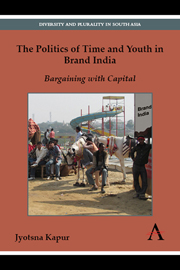Book contents
- Frontmatter
- Dedication
- Contents
- Acknowledgments
- Introduction: After Me the Flood
- Chapter 1 Brand India's Biggest Sale: The Cultural Politics and Political Economy of India's “Global Generation”
- Chapter 2 Arrested Development and the Making of a Neoliberal State
- Chapter 3 For Some Dreams a Lifetime is Not Enough: The Rasa Aesthetic and the Everyday in Neoliberalism
- Chapter 4 An “Arranged Love” Marriage: India's Neoliberal Turn and the Bollywood Wedding Culture Industry
- Chapter 5 Ek Haseenah Thi (There Once Was a Maiden): The Vanishing Middle Class and Other Neoliberal Thrills
- Conclusion
- Notes
- References
- Index
Introduction: After Me the Flood
Published online by Cambridge University Press: 05 March 2014
- Frontmatter
- Dedication
- Contents
- Acknowledgments
- Introduction: After Me the Flood
- Chapter 1 Brand India's Biggest Sale: The Cultural Politics and Political Economy of India's “Global Generation”
- Chapter 2 Arrested Development and the Making of a Neoliberal State
- Chapter 3 For Some Dreams a Lifetime is Not Enough: The Rasa Aesthetic and the Everyday in Neoliberalism
- Chapter 4 An “Arranged Love” Marriage: India's Neoliberal Turn and the Bollywood Wedding Culture Industry
- Chapter 5 Ek Haseenah Thi (There Once Was a Maiden): The Vanishing Middle Class and Other Neoliberal Thrills
- Conclusion
- Notes
- References
- Index
Summary
It is spring. And all at once have returned from the distant past
Those dreams, the youth
That had died on your lips
And after each death been born again
[...]
It is spring. And one by one, the old accounts
All the questions and answers,yours and mine,
Have been reopened
Once again, from a new beginning.
—Faiz Ahmed FaizEvoking the longing for revolution in words that could have been addressed to a beloved, the Marxist Urdu poet, Faiz Ahmed Faiz, inscribes revolutionary struggles with a sense of time that is at once immanent and transcendent. In other words, while specific people rebel in specific historical contexts and circumstances, they hope to transcend that history and bring in a new future. It is this time-consciousness that defeats failure, for, as Faiz reminds us, even defeat carries within it the seeds of another rebirth. Making a revolution was, for Faiz, an act of love that might end in loss (hence, dreams that have died on “your lips”) and a striving for authentic life that simultaneously united “lovers” in the present and across history — so long as injustice remained intact. Faiz wrote this couplet in 1975, and I read it here as the determined recognition of a generation who, having defeated the colonial rulers, must now reckon with postcolonial “national” elites passing off their class interests as those of the nation — a nation that, by 1975, was partitioned into three countries.
- Type
- Chapter
- Information
- The Politics of Time and Youth in Brand IndiaBargaining with Capital, pp. 1 - 20Publisher: Anthem PressPrint publication year: 2013



